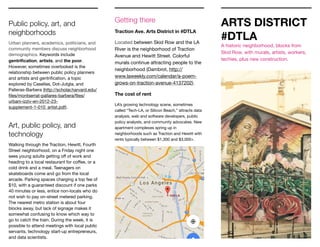#DTLA Arts District Brochure | Traction Avenue and Hewitt Street
- 1. Public policy, art, and neighborhoods Urban planners, academics, politicians, and community members discuss neighborhood demographics. Keywords include gentri?cation, artists, and the poor. However, sometimes overlooked is the relationship between public policy planners and artists and gentri?cation, a topic explored by Casellas, Dot-Jutgla, and Palleras-Barbera (http://scholar.harvard.edu/ ?les/montserrat-pallares-barbera/?les/ urbani-izziv-en-2012-23- supplement-1-010_artist.pdf). Art, public policy, and technology Walking through the Traction, Hewitt, Fourth Street neighborhood, on a Friday night one sees young adults getting o? of work and heading to a local restaurant for co?ee, or a cold drink and a meal. Teenagers on skateboards come and go from the local arcade. Parking spaces charging a top fee of $10, with a guaranteed discount if one parks 40 minutes or less, entice non-locals who do not wish to pay on-street metered parking. The nearest metro station is about four blocks away, but lack of signage makes it somewhat confusing to know which way to go to catch the train. During the week, it is possible to attend meetings with local public servants, technology start-up entrepreneurs, and data scientists. Getting there Traction Ave. Arts District in #DTLA Located between Skid Row and the LA River is the neighborhood of Traction Avenue and Hewitt Street. Colorful murals continue attracting people to the neighborhood (Dambrot, http:// www.laweekly.com/calendar/a-poem- grows-on-traction-avenue-4137202). The cost of rent LA’s growing technology scene, sometimes called “Tech-LA, or Silicon Beach,” attracts data analysis, web and software developers, public policy analysts, and community advocates. New apartment complexes spring up in neighborhoods such as Traction and Hewitt with rents typically between $1,300 and $3,000+. ARTS DISTRICT #DTLA A historic neighborhood, blocks from Skid Row, with murals, artists, workers, techies, plus new construction.
- 2. Echoes of a beatnik past in #DTLA Notable places to visit: American Hotel Hub LA Experience co-working, coffee shops, and the emerging #TechLA scene (Below: Hub LA) A working community Small businesses like co?ee shops, restaurants, convenience stores, and a game- arcade bring young workers to the area. Next door to Skid Row Spaces like Hub LA, pictured below, provide opportunities for people to share work space and host events. Parking Metered street parking is available, and so is lot parking. However, lot parking is based on a sliding scale to a maximum of $10 past 40-minutes. Bring cash. About This brochure is part of a cultural studies project by Gail Taylor, MA, publisher of altscholar.org.. Contact: (937) 271-1010, gdtwriter@gmail.com. Hub LA Civic leaders, web developers, and start-up culture a?cionados travel to Downtown LA's Hub LA on Traction Avenue for regular meet-ups and co- working events. Organizations like Hack for LA, City of Los Angeles, FWD.us, and Organizing for Action (OFA) collaborate on civic initiatives such as Immigrant Heritage Month. The space is gritty, authentic LA, and perfect for brainstorming and networking.


